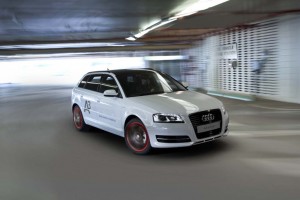Even as the automaker prepares to launch its first U.S. fleet-test of a plug-in hybrid, Audi CEO Rupert Stadler is confirming expansive new plans for a range of battery-based vehicles from some of its smallest to its sportiest offerings.
That electric assault will begin in 2014, Stadler announced at Audi’s annual news conference, when it begins offering a plug-in “e-tron” option for the new A3 subcompact. The battery-based A3 will begin field testing in four U.S. markets this month, as TheDetroitBureau.com reported earlier this week. (Click Here for more on the fleet test.)
Among other models that will get plug-in and other advanced hybrid options are the
Meanwhile, the maker will tap into its Le Mans racing program, where it has long dominated with its Quattro all-wheel-drive and diesel technologies, and where it has introduced a new flywheel-based hybrid system on the R18 race car. That technology – which stores energy in a fast-spinning wheel, rather than a battery – is expected to show up on a version of the maker’s A4, dubbed the B9, in the next several years, according to Britain’s Autocar.
Flywheel technology is significantly lighter than a battery and is particularly useful for racing – or performance street cars – but doesn’t store as much energy, limiting its advantages when it comes to boosting fuel economy.
That’s where more conventional hybrid power will likely dominate in the Audi line-up.
The maker had previously announced a version of e-tron technology will first appear in Audi’s R8 supercar next year. But along with the A3, Stadler indicated plug-in hybrid drivelines will also be offered on the A4 and the big Q7 sport-utility vehicle. That could be a significantly selling point for the vehicles, especially in Europe where a number of cities are considering tolls – as London has initiated – to enter the central city.
Other communities are considering outright bans on automobiles in urban centers, though they would open up access to vehicles running on battery power.

